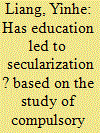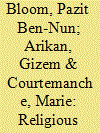| Srl | Item |
| 1 |
ID:
170103


|
|
|
|
|
| Summary/Abstract |
Has education led to secularization? Using microdata from the Chinese General Social Survey (CGSS), we take the implementation of the Compulsory Education Law (CEL) in 1986 in China as the instrumental variables (IV) for personal educational attainment. We study the causal effect of education on personal religious beliefs and explore the potential mechanisms. The empirical results show that education can lead to secularization. More precisely, individual religious belief decreases by 1.5% with one additional year of personal education. In addition, the increase in regional urbanization significantly affects religious beliefs by replacing the insurance function of religion and reducing information acquisition costs. Moreover, there is an alternative relationship between religious activities and social activities, and women affected by the CEL experience a higher negative impact on religious beliefs than men.
|
|
|
|
|
|
|
|
|
|
|
|
|
|
|
|
| 2 |
ID:
140168


|
|
|
|
|
| Summary/Abstract |
Somewhat paradoxically, numerous scholars in various disciplines have found that religion induces negative attitudes towards immigrants, while others find that it fuels feelings of compassion. We offer a framework that accounts for this discrepancy. Using two priming experiments conducted among American Catholics, Turkish Muslims, and Israeli Jews, we disentangle the role of religious social identity and religious belief, and differentiate among types of immigrants based on their ethnic and religious similarity to, or difference from, members of the host society. We find that religious social identity increases opposition to immigrants who are dissimilar to in-group members in religion or ethnicity, while religious belief engenders welcoming attitudes toward immigrants of the same religion and ethnicity, particularly among the less conservative devout. These results suggest that different elements of the religious experience exert distinct and even contrasting effects on immigration attitudes, manifested in both the citizenry's considerations of beliefs and identity and its sensitivity to cues regarding the religion of the target group.
|
|
|
|
|
|
|
|
|
|
|
|
|
|
|
|